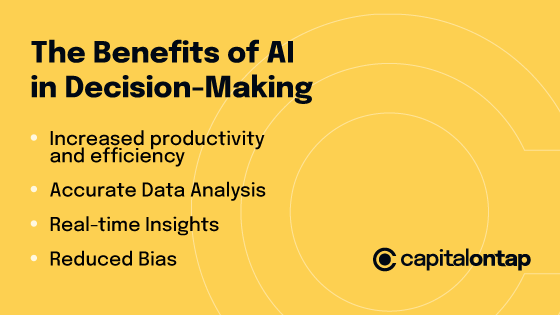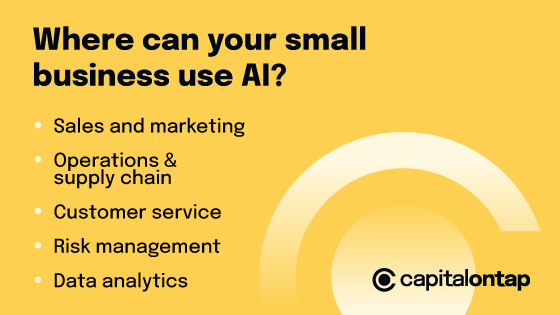Jump to a section
Before deciding how AI can help you make better business decisions, you need to fully grasp what AI is and its capabilities.
It’s crucial to grasp that the term "artificial intelligence" or AI encompasses a wide range of technologies and is not limited to one single thing. AI serves as an umbrella term, encompassing diverse technologies at various stages of development, from ChatGPT to Google or Apple Maps.
You also need to understand what differentiates AI from conventional software, and results in its increased intelligence. It all comes down to “machine learning.” Machine learning is a subset of AI, and it’s the technology that gives AI most of its power.
Machine learning is the process that means AI can learn and improve on its own. Human specialists train an AI tool using data, teaching it how to achieve specific goals. Then, when given new data, the AI tool uses its learned knowledge to independently accomplish the desired outcome. As time passes, the AI tool analyses its previous actions, learns from them, and continuously improves its performance for better results in the future.
The Benefits of AI in Decision-Making
The capabilities of AI and machine learning can greatly benefit small business owners, empowering them to make more informed decisions based on AI's enhanced insights and recommendations:

Increased productivity and efficiency
By automating repetitive tasks, AI frees up valuable time for business owners and employees to focus on more strategic and high-value work. This allows for a more thoughtful and informed approach to decision-making, as individuals can dedicate their attention to critical aspects of the business that require human expertise.
For example, by using AI to carry out quality control, a manufacturing company could save time and resources while improving accuracy. This allows employees to focus on strategic aspects of the business, such as product development and decision-making, leveraging their expertise for higher-value work.
Accurate data analysis
AI's ability to analyse data and identify areas for improvement can provide valuable insights that inform decision-making. For example, through data analysis, AI can uncover inefficiencies in supply chain management, highlight patterns in customer behaviour, or identify accounting discrepancies in your books, enabling you to make data-driven decisions and optimise operations.
Real-time insights
Real-time insights allow small business owners to have a current and accurate understanding of their operations. AI systems can collect and process data from various sources such as sales, customer interactions, and market trends, providing you with up-to-date information on key metrics.
For instance, imagine owning a small retail store and using an AI-powered analytics system that highlights a sudden surge in online sales for a specific style of dresses as they’re trending on social media. Armed with this real-time insight, you can quickly adapt your inventory and marketing strategies to meet the increased demand, resulting in higher sales, improved customer satisfaction, and a competitive edge in the market
This real-time visibility into business performance enables you to identify emerging trends, spot potential issues, and make proactive decisions to address them promptly.
Reduced bias
AI can help establish standardised decision-making processes based on predefined criteria. By implementing consistent rules and algorithms, you can ensure that decisions are made fairly and impartially, regardless of personal biases or subjective judgments. For example, you could use an AI chatbot to handle customer inquiries and support. The AI chatbot is trained on a diverse dataset, ensuring it responds equally and respectfully to customers of different backgrounds. By avoiding biased language or discriminatory responses, the AI chatbot provides a fair and unbiased customer service experience.
It is important to note that while AI has the potential to reduce bias, it is not immune to bias itself. The responsibility lies with you to implement ethical practices, ensure diverse and representative datasets, and monitor AI systems to maintain fairness and inclusivity in your decision-making processes.
How AI Can Enhance Decision-Making for Small Businesses
AI technology offers significant enhancements to decision-making processes for small businesses. By leveraging AI capabilities, you can gain valuable insights, automate tasks, and make informed decisions based on data-driven intelligence. Let's explore some key areas where AI can bring about transformative improvements.
Predictive analysis for sales forecasting
With the ability to analyse large volumes of data, AI can predict future trends and customer behaviour. This information can improve your decisions regarding marketing strategies, pricing, and product development, increasing your chances of success, profitability, and competitive advantage.
Fraud detection and prevention
AI plays a vital role in fraud detection and prevention for small businesses. By employing advanced algorithms, AI systems can analyse vast amounts of data to identify patterns and anomalies that may indicate fraudulent activities. This can help you detect potential fraud early on, prevent financial losses, and safeguard the integrity of your operations. With AI's ability to continuously learn and adapt, it can stay ahead of evolving fraud techniques, providing enhanced security measures for your business.
Inventory management and optimisation
AI technology can revolutionise inventory management for small businesses. With AI-powered systems, businesses can analyse historical sales data, market trends, and other relevant factors to optimise inventory levels and minimise stock sell outs or excess inventory. This helps streamline operations, reduce carrying costs, and ensure products are available when customers need them. AI can also automate replenishment processes and provide real-time insights to optimise supply chain efficiency, resulting in cost savings and improved customer satisfaction.
Financial analysis and reporting
AI-based financial analysis and reporting tools can transform how small businesses manage their finances. These tools can process and analyse financial data, generate accurate reports, and provide valuable insights into the financial health of the business. AI can automate tasks such as data entry, reconciliation, and financial statement generation, reducing the time and effort required for financial reporting. By leveraging AI in financial analysis, small business owners can gain a deeper understanding of their financial performance, make informed decisions, and improve overall financial management.
Best practices for AI decision making
Your small business is your pride and joy, and it's well-known that a single bad decision can have a detrimental impact on its success. Therefore, implementing AI in your decision-making process requires thoughtful consideration and adherence to best practices. By following these guidelines, you'll be well on your way to successfully integrating AI technologies and maximising their impact on your decision-making processes.
Identify your business' decision-making needs
To effectively implement AI in decision-making, start by identifying the specific needs of your business. Some possible areas include:

Reflecting on the key areas where AI can bring the most value will help you focus on implementing AI solutions that align with your business goals and deliver the desired outcomes.
Choose the right AI decision making tools
Selecting the right AI-powered decision-making tools is crucial. Evaluate different AI solutions available in the market and assess their functionalities, ease of integration, and compatibility with your existing systems. Look for tools that offer user-friendly interfaces, customizable features, scalability, security, and affordability. Seek recommendations and consult with experts to make informed decisions that meet your business requirements.
Ensure proper training for your team
Providing proper training and support is essential for successful AI implementation. Ensure your employees have the necessary skills to work with AI-powered tools effectively.
Offer training programs or workshops to familiarise them with the functionalities of your chosen AI solution - many AI software providers will offer free demo sessions to their customers. Establish a support system or designate an AI champion who can provide guidance and address any concerns or technical issues that may arise.
Regularly update your decision-making strategy
AI implementation is an iterative process. Continuously evaluate the effectiveness of AI solutions in driving better decisions and monitor their impact on your business outcomes. Stay informed about advancements in AI technology and explore new features or enhancements that can further improve your decision-making capabilities. Collect feedback from your team and customers to identify areas of improvement and adjust your AI-driven decision-making strategy accordingly.
Challenges and risks of using AI in decision making
Implementing AI in decision-making for your small business offers numerous benefits, but it's essential to be aware of the challenges and risks involved. By understanding these potential pitfalls, you can proactively address them and ensure a successful AI integration.
Technical complexity
One of the challenges of using AI in decision-making is the technical complexity associated with its implementation. AI systems often require specialised knowledge and expertise to set up and maintain. Small business owners may face difficulties in finding the right technical resources or expertise to handle AI projects. It is crucial to carefully evaluate the technical requirements of AI solutions, consider its scalability and compatibility with existing systems, and ensure appropriate technical support is on hand if you need it.
Data privacy and security
AI systems rely on large amounts of data to make accurate predictions and decisions. You need to ensure your small business has robust data protection measures in place to safeguard sensitive customer information and comply with relevant regulations, such as GDPR. It is vital to implement proper data encryption, access controls, and data anonymisation techniques to protect data privacy and mitigate the risk of data breaches.
Lack of human oversight
While AI can automate decision-making processes, it's important to maintain human oversight. Relying solely on AI algorithms without human intervention can lead to unintended consequences or biases. You should ensure that AI systems are designed to be transparent and explainable, allowing them to understand how decisions are made. Regular monitoring and evaluation of AI outputs are crucial to detect any biases or errors and make necessary adjustments to improve decision-making accuracy.
Cost and ROI
Cost is another consideration when implementing AI in decision-making. While AI can provide significant benefits, there are associated costs, such as acquiring AI technologies, training personnel, and maintaining infrastructure. Small businesses need to carefully assess the potential return on investment (ROI) and determine if the benefits outweigh the costs. Conducting a cost-benefit analysis, considering factors such as increased productivity, efficiency gains, and improved decision-making accuracy, can help small business owners make informed decisions about investing in AI technologies.
By being aware of these challenges and risks, you can develop strategies to address them effectively. Collaborating with experts, implementing strong data privacy measures, maintaining human oversight, and conducting thorough cost-benefit analysis are essential steps in mitigating risks and maximising the benefits of AI in your decision-making processes.
The bottom line
AI presents tremendous opportunities for small business owners to make better decisions and drive growth. By understanding the capabilities of AI, such as predictive analytics, fraud detection, inventory management, and financial analysis, you can leverage these technologies to gain valuable insights, optimise operations, and improve decision-making.
However, it is important to acknowledge the challenges and risks associated with AI implementation, such as technical complexity, data privacy and security concerns, lack of human oversight, and cost considerations. By following best practices, including identifying your business's decision-making needs, choosing the right AI-powered tools, ensuring proper training and support, and regularly updating your decision-making strategy, you can navigate these challenges and unlock the full potential of AI for your small business.











